
Journal of Developing Societies
Scope & Guideline
Navigating the Challenges of Development through Research
Introduction
Aims and Scopes
- Interdisciplinary Research on Development:
The journal focuses on interdisciplinary studies that address development issues from various perspectives, including sociology, economics, political science, and environmental studies. - Community Empowerment and Resistance:
A core area of research is the examination of community-led initiatives and resistance movements, especially in marginalized and indigenous populations, highlighting their role in shaping development outcomes. - Environmental Justice and Sustainability:
The journal emphasizes the importance of environmental sustainability and justice, exploring the impacts of development on natural resources and local communities. - Socio-cultural Dynamics of Development:
Research often investigates the socio-cultural factors influencing development, including identity, tradition, and modernity, and how these elements interact with economic and political processes. - Health and Social Well-being:
Papers frequently address health issues, particularly in the context of pandemics and public health responses, examining their implications for social equity and community resilience. - Policy Analysis and Governance:
The journal provides critical analyses of development policies and governance structures, assessing their effectiveness and implications for societies in transition.
Trending and Emerging
- Dispossession and Environmental Justice:
There is a growing focus on issues of dispossession related to environmental concerns, particularly in the context of land rights and resistance movements, highlighting the intersection between environmental justice and social equity. - Impact of COVID-19 on Development:
The pandemic has catalyzed a surge in research examining its effects on various aspects of development, including health, governance, and social structures, indicating a critical need for understanding resilience and adaptation. - Innovative Approaches to Development Solutions:
Emerging themes emphasize innovative and community-centered solutions to development challenges, particularly through technology and local knowledge, showcasing the potential for grassroots initiatives. - Cultural Perspectives on Development:
Research increasingly explores the cultural dimensions of development, including how cultural practices and beliefs influence economic and social outcomes, reflecting an appreciation for local context. - Youth Engagement and Development:
There is an emerging trend focused on the role of youth in development processes, especially in advocating for change and sustainability, recognizing the importance of younger generations in shaping future societies.
Declining or Waning
- Traditional Economic Development Models:
Papers focusing on conventional economic development models and their efficacy have decreased, as researchers shift toward more innovative and context-specific approaches. - Purely Quantitative Analyses:
There has been a noticeable decline in studies that rely exclusively on quantitative methods without integrating qualitative insights, indicating a preference for mixed-methods approaches that capture the complexity of development issues. - Generalized Global South Perspectives:
Research that offers generalized perspectives on the Global South, without contextual nuances, is becoming less frequent, as the journal increasingly values localized studies that reflect specific societal dynamics. - Focus on Post-Colonial Theory Alone:
While post-colonial theory remains relevant, there is a decline in papers that solely focus on this framework without integrating other theoretical approaches, as the discourse evolves to include broader frameworks. - Discussions on Traditional Gender Roles:
There is a waning interest in discussions that solely emphasize traditional gender roles without considering intersectional perspectives, reflecting a shift toward more comprehensive analyses of gender and development.
Similar Journals
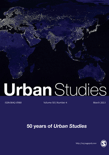
URBAN STUDIES
Pioneering Research for Tomorrow's Urban ChallengesURBAN STUDIES, published by SAGE Publications Ltd, stands as a premier journal in the field of urban studies and environmental science, evidenced by its prestigious Q1 ranking in both categories for 2023. With an ISSN of 0042-0980 and an E-ISSN of 1360-063X, this UK-based journal has been disseminating pivotal research since its inception in 1964, and will continue to do so until 2024. As a leader in the social sciences, it ranks #11 out of 279 in the field of Urban Studies and #15 out of 219 in Environmental Science, achieving remarkable percentiles of 96% and 93% respectively. Although not an open-access journal, URBAN STUDIES provides a platform where scholars, practitioners, and students can engage with cutting-edge research, critical analyses, and innovative solutions addressing the complexities of urban environments. By publishing studies that encompass economic, social, and environmental dimensions of urbanization, the journal contributes significantly to the discourse on sustainable development and urban planning.

Sociology of Development
Innovating perspectives on the pathways of development.Sociology of Development is a premier academic journal published by University of California Press, Journals Division, dedicated to advancing the field of development studies through innovative sociological perspectives. With an E-ISSN of 2374-538X, this journal serves as a vital platform for researchers, professionals, and students alike, providing critical insights into social, economic, and political dimensions of development from 2019 to 2024. Achieving a commendable Q2 ranking in the 2023 development category and positioned at 164 out of 306 in Scopus rankings, it demonstrates its growing influence and commitment to fostering scholarly discourse. Although not openly accessible, Sociology of Development continuously aims to enrich its readership with rigorous research articles, reviews, and theoretical debates, making it an essential resource for anyone engaged in the complex world of developmental sociology.
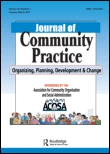
Journal of Community Practice
Empowering voices in community development and practice.Welcome to the Journal of Community Practice, an esteemed multidisciplinary journal dedicated to advancing knowledge and practice in community development, public administration, and sociology. Published by Routledge Journals, Taylor & Francis Ltd, the journal has sustained its impactful presence since 1994, reaching a broad audience of researchers, practitioners, and students alike. As part of its mission to enrich community practice, the journal offers a platform for innovative research and thoughtful discourse, regularly achieving a Q2 category ranking in key fields including Development, Public Administration, and Sociology and Political Science. With an impressive standing in Scopus rankings—placing among the top quartile of journals in Sociology and Political Science—this journal not only informs but also shapes policy and community initiatives. Though primarily subscription-based, the journal remains committed to disseminating quality research and fostering evidence-based approaches that enhance community well-being. We invite you to explore the latest findings and contribute to the ongoing dialogue that is vital for effective community engagement.
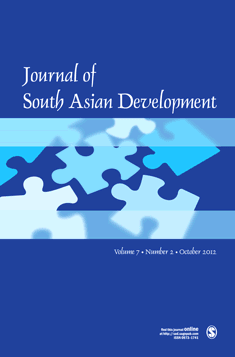
Journal of South Asian Development
Advancing Insights into Socio-Economic DevelopmentThe Journal of South Asian Development is a premier academic publication dedicated to advancing the critical study of socio-economic dynamics within the South Asian region. Published by SAGE Publications India Pvt Ltd, this journal serves as a vital forum for scholars, researchers, and practitioners interested in exploring diverse interdisciplinary approaches to development challenges, policies, and practices in South Asia. With an impressive impact factor that recognizes its contributions to the fields of Business and International Management, Development, Economics, and History, the journal maintains a distinguished presence in Q3 quartiles across multiple categories as of 2023. Researchers can also benefit from its strong rankings in relevant Scopus categories, illustrating its academic rigor and relevance. Although currently not an open-access journal, it provides valuable insights and analyses from 2006 to 2024, continuing to foster innovative discussions and empirical investigations that are essential for understanding the complexities of development in this vibrant region.

WORLD DEVELOPMENT
Transforming global perspectives on development.WORLD DEVELOPMENT is a prestigious peer-reviewed journal published by Pergamon-Elsevier Science Ltd, renowned for advancing the field of global development studies. Established in 1973, this influential journal dives deep into the interconnected realms of economics, sociology, political science, geography, and planning, aiming to provide critical insights and innovative solutions to complex global issues. With an impressive impact factor and a Q1 ranking across multiple disciplines, including Development and Economics and Econometrics, WORLD DEVELOPMENT ranks among the top journals in its field, ensuring high visibility and engagement for contributors. Researchers, professionals, and students engaged in development studies will find WORLD DEVELOPMENT an invaluable resource, as it publishes rigorous empirical research, theoretical discussions, and policy analysis that both informs and challenges prevailing paradigms. The journal remains committed to fostering a comprehensive understanding of development processes worldwide, making it an essential platform for knowledge exchange in this critical domain.
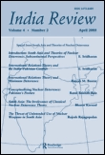
India Review
Charting the Course of India's Sociopolitical EvolutionIndia Review is a leading academic journal published by Routledge Journals, Taylor & Francis Ltd, focusing on the dynamic interplay between political science, international relations, and sociology as they pertain to the Indian context. With an ISSN of 1473-6489 and E-ISSN 1557-3036, this journal serves as an essential resource for researchers, professionals, and students interested in contemporary India and its global engagements. Though classified as a Q3 journal in both Political Science and Sociology categories for 2023, it provides significant contributions to the debate on India's role in the global arena, reflecting a percentile rank of 54th in Political Science and 51st in Sociology according to Scopus rankings. The journal's open access options ensure wide dissemination of research findings while maintaining rigorous academic standards. The scope of the journal, covering converged years from 2010 to 2024, allows for a comprehensive understanding of evolving political and social paradigms in India. By publishing high-quality research, India Review plays an important role in advancing scholarly discussions and informing policy decisions in the region.
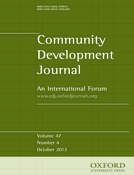
COMMUNITY DEVELOPMENT JOURNAL
Empowering Communities, Shaping Futures.COMMUNITY DEVELOPMENT JOURNAL, published by Oxford University Press, stands as a pivotal resource in the field of development studies. With an ISSN of 0010-3802 and an E-ISSN of 1468-2656, this journal has been contributing to academic discourse since its inception in 1966 and continues to do so through 2024. As a recognized publication in the Q2 category for Development, and ranked #103 out of 306 journals in the field according to Scopus, it represents a robust platform for sharing innovative research and practices that address pressing community development challenges. While the journal is not currently open access, it remains highly influential, reaching a global audience of researchers, policymakers, and practitioners dedicated to enhancing the social fabric and economic vitality of communities. Located in the heart of the UK at GREAT CLARENDON ST, OXFORD OX2 6DP, it reflects Oxford University Press's commitment to high-quality scholarship and impactful research dissemination.
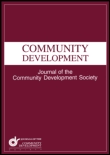
Community Development
Empowering Communities Through ResearchCommunity Development is a premier academic journal published by ROUTLEDGE JOURNALS, TAYLOR & FRANCIS LTD, focusing on the dynamic fields of geography, planning, sociology, and political science. With an ISSN of 1557-5330 and an E-ISSN of 1944-7485, the journal champions interdisciplinary research aimed at addressing prevalent issues in community development, policy-making, and sustainable practices. Currently situated in the United Kingdom, it holds a prestigious reputation, reflected in its Q2 ranking in both Geography, Planning and Development and Sociology and Political Science categories for 2023, indicating its significant influence and relevance in these academic fields. With a Scopus ranking that positions it in the top quartile of relevant journals, Community Development serves as an indispensable resource for researchers, professionals, and students who seek to engage deeply with contemporary challenges and innovations in community dynamics from 2010 through to 2024. By fostering impactful research and dialogue, it plays a crucial role in shaping the future of community development practices and policies.
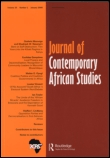
Journal of Contemporary African Studies
Navigating the intersections of geography, politics, and development in Africa.The Journal of Contemporary African Studies, published by Routledge Journals, Taylor & Francis Ltd, is a premier academic journal dedicated to advancing the understanding of social, economic, and political developments across Africa. Since its inception in 1981, the journal has served as a crucial platform for scholars, researchers, and practitioners to disseminate innovative research and critical discourse within the realms of Development, Geography, and Political Science. Ranked in the Q2 category for several disciplines, including Development and Geography in 2023, it occupies a significant role in informing policy and fostering global dialogue around African studies. With its commitment to rigorous scholarship and the promotion of diverse voices, the journal continues to shape debates in contemporary Africa, making it an indispensable resource for anyone invested in the continent's future. Accessible through various academic databases, the journal is poised to reach a wide audience committed to fostering impactful research and insights in African contexts.
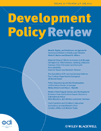
Development Policy Review
Empowering Policymakers with Cutting-Edge InsightsDevelopment Policy Review is a prestigious journal published by WILEY that serves as a critical platform for the dissemination of scholarly work in the fields of development studies, geography, and policy analysis. Established in 1966 and currently indexed with an ISSN of 0950-6764 and E-ISSN 1467-7679, the journal features a wide array of research articles that address pressing global issues, offering insights and solutions for policymakers, researchers, and practitioners alike. With a 2023 impact factor reflected in its Q2 ranking across key categories, including Development and Geography, the journal is recognized for its significant contributions to the understanding and practice of development and environmental management. Despite being a subscription-only publication, it remains a vital resource for academics and professionals dedicated to impacting societal change through informed policy and practice. Through a rigorous peer-review process, Development Policy Review ensures that only the highest quality research is presented, making it an essential read for anyone involved in the fields of development and policy-making. With a commitment to advancing knowledge and fostering dialogue, this journal is critical for those aiming to keep abreast of emerging trends and research in an ever-evolving field.